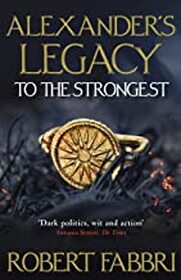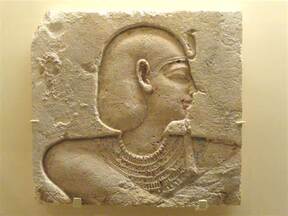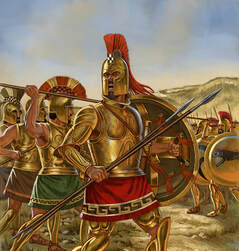 I have been reading books by Robert Fabbri for several years, following his series about the rise of the career of the Emperor Vespasian. This led me to this book, “Alexander’s Legacy: To The Strongest”, the first in a 2 book series about what happened to the Macedonian Empire after Alexander the Great died. Well, quite a lot happened and this book tells it in an exciting fashion. To give you the backstory, if you didn’t already know it: Alexander has conquered his way across the Middle East, Central Asia and into the northern limits of India. He returns to Babylon where he succumbs to illness. Some say he was poisoned, some that he died of natural causes and some say he died of wounds suffered in his final battle in India. You can make up your own mind about that but given the ambitions of several of the people around Alexander, poisoning can’t be ruled out.  Alexander the Great Alexander the Great On his death bed Alexander is surrounded by his seven bodyguards, the men who have followed him loyally across continents. They have only one question on their lips: who is to succeed Alexander? This is not a question Alexander wishes to answer, probably because he doesn’t want anyone to eclipse his achievements. Instead, he replies enigmatically “The strongest”, passes his ring to Perdikkas, one of the seven, and then dies. Perdikkas sees Alexander’s final act as an indication that he should take up the reins of power, which puts him in a minority of one. The other six will only accept the authority of a named successor. Alexander’s natural heir is his half-brother, Phillip, who is mentally incapable of ruling without someone to guide him. This starts a rivalry over who that someone should be.  Ptolemy - founder of a dynasty Ptolemy - founder of a dynasty Alexander also leaves a pregnant wife, Roxanna, and if her child is a boy, he becomes heir, but he would also need a regent until he comes of age. Some of the bodyguards have lesser kinships to Alexander which might allow them to claim the throne, others see themselves in the role of regent, either to Phillip or to the unborn child. Throw into the mix Alexander’s exiled but power-hungry mother, Olympia, who sees Alexander’s death as her opportunity to retake her place at the centre of events and this sets the scene not just for this book, but for the series. The seven bodyguards vie for power and eventually agree to divide the empire between them, controlling large swathes of it until Roxanna’s child (if it’s a boy) comes of age or until some other solution presents itself. In Macedon itself there is Antipatros, the Regent left there by Alexander to govern in his absence. Ptolemy* takes Egypt, with ambitions to expand his satrapy to the west. Perdikkas retains control of Babylon and various smaller tracts of land are handed over to the remaining members of the bodyguard. Also, each has an army, but no single army is capable of seizing control of the empire.  Then there is Alexander’s body. Whoever gains control of that also has a stronger bargaining position. While Perdikkas has the body in Babylon he is in a strong position, but can he keep control of it once he sends it to Macedon to be buried? Meanwhile, Eudamus, Alexander’s Greek secretary and, more recently, a general, knowing he can never inherit the throne of Macedon, sets himself up as king maker, offering his advice and support to whoever makes him the best offer. He isn’t known as “a sly little Greek” for nothing. If you don’t know what happens next (I didn’t) then you won’t want me to spoil the story by saying anything more. The story is told using several different viewpoints, with several of the main characters taking turns to tell their own part of the tale. No doubt is left as to which point of view is being seen at any time, as the chapter headings make that clear. I highly recommend “Alexander’s Legacy: To The Strongest” The plot is engaging and trots along at a nice pace and for fans of Greek or Roman historical fiction I would say that this is a good read and well worth getting into. The research (as far as I can tell) is solid, though the author admits to having to take some small liberties. But he doesn’t purport to make this anything other than a work of fiction, so we can allow him some poetic licence. The wealth of ancient Greek and Macedonian names provides room for confusion; Krateros and Kleitos kept me guessing on more than one occasion. But these were real people once upon a time, so their names can’t really be changed. If you are a feminist, be prepared to get angry because, with the exception of Olympia and a cousin of Alexander’s by the name of Adea, they are seen as a means to cement alliances, no more. Even Adea, who is quite a feisty type, is set only on snagging herself a husband in order to gain power. But that was the nature of the patriarchy in the 4th century BC and it can’t be changed now. I have one adverse comment to make about the book, which is unusual for an author with Fabbri’s track record. The editing is quite poor. There are jumps in the timeline that are made without any sort of signpost, so one character will be engaged in a scene with another and then suddenly a third character appears without warning or introduction. Or there are time gaps or changes of location which take time to work out as they aren’t signposted in any way. In one sentence the characters may be in the throne room and in the next they are apparently somewhere else, without seeming to have moved. There are also numerous typos and punctuation errors. Whoever at Corvus Books was responsible for that really needs to take a fresh look at their work, because it is quite shoddy in parts. However, those are technical issues and shouldn’t deter any reader who wants an enjoyable Ancient Macedonian drama to get their teeth into. I highly recommend “Alexander’s Legacy: To The Strongest” by Robert Fabbri. To find out more about the book, just click on the cover image at the top of this blog. * Ptolemy was the founder of a dynasty of Macedonian-Egyptian Pharaohs that ended with Cleopatra and her famous suicide by asp bite. And if you would like to become a guest reviewer for the Selfishgenie blog, just go to the contacts page to communicate with us. There are just three rules:
If you have enjoyed this blog, found it entertaining or informative (or all three) then be sure not to miss future editions by signing up for our newsletter. Just click the button below.
0 Comments
Leave a Reply. |
AuthorThis blog is compiled and curated by the Selfishgenie publishing team. Archives
June 2025
|

 RSS Feed
RSS Feed